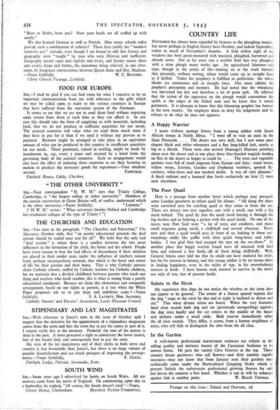SCIENTIFIC EDUCATION
Stn,—I am unqualified to speak about present-day education, as it is nearly fifty years since I left school and a considerable time since my sons kept me in touch with their school curriculum, but I can't help wondering if all the " improvements " since my time really deserve the name of " progress." When I was at Christ's Hospital we who were on. the classical side had instruction in the elements of nearly every branch of science, physics, chemistry, electricity, sound, heat, magnetism, &c. Probably few of us who are still alive have much knowledge of these subjects now, though now and again " Airs from the Eden of youth awake and stir in our souls " when we hear something scientific mentioned. Looking back half a century I can see what was the benefit of these studies ; they helped to provide balance in our minds and they kept us from being lopsided. Incidentally we got a good deal of fun out of these lessons. One of the classical masters, called with mingled affection and contempt " Old Buffer," hated us going to chemistry before going to him.
" Been to Stinks, have you? Now your heads are all stuffed up with smells."
We also learned German as well as French. How many schools today provide such a combination of subjects? These facts justify the " laudator temporis acti" attitude, even though I am bound to add that history and geography were " taught " by men who were illiterate and inefficient. Geography meant capes and capitals and rivers, and history meant dates and events, kings and battles, the monotony being relieved, in one class- room, by imaginary conversations between Queen Anne and Mrs. Masham.
—Yours faithfully, W. C. BUNCHER. Christ Church Vicarage, Lichfield.



























 Previous page
Previous page